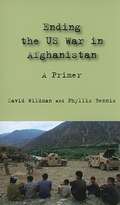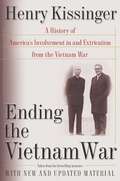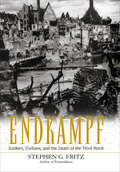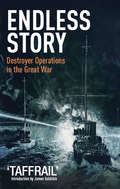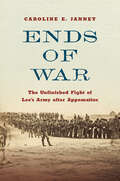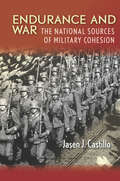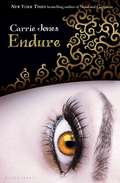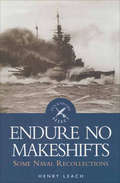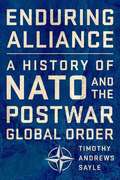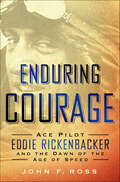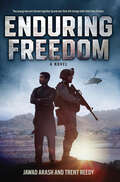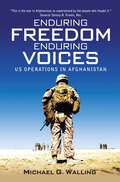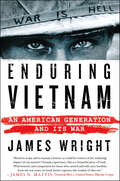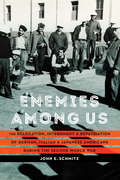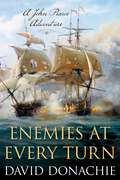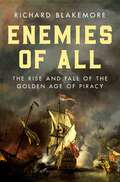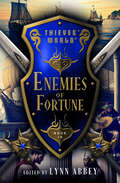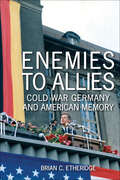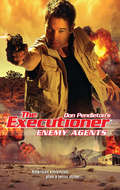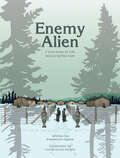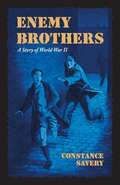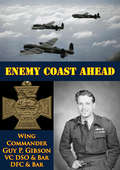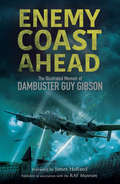- Table View
- List View
Ending the US War in Afghanistan: A Primer
by Phyllis Bennis David WildmanThe Bush Administration answered the terror attacks of September 11, 2001 with what it called the "global war on terror," first with the assault on Afghanistan and then the invasion of Iraq. More and more Americans joined the opposition to the Iraq war, but for many, Afghanistan remained "the good war." But was the war on Afghanistan ever a "good war?" And will President Obama's planned escalation of US troop presence in Afghanistan work? In this easy-to-read volume of "frequently asked questions," analysts David Wildman and Phyllis Bennis examine a wide range of key issues regarding the US war in Afghanistan.
Ending the Vietnam War: A History of America's Involvement in and Extrication from the Vietnam War
by Henry KissingerNow, for the first time, Kissinger gives us in a single volume an in-depth, inside view of the Vietnam War, personally collected, annotated, revised, and updated from his bestselling memoirs and his book Diplomacy.Many other authors have written about what they thought happened—or thought should have happened—in Vietnam, but it was Henry Kissinger who was there at the epicenter, involved in every decision from the long, frustrating negotiations with the North Vietnamese delegation to America's eventual extrication from the war. Here, Kissinger writes with firm, precise knowledge, supported by meticulous documentation that includes his own memoranda to and replies from President Nixon. He tells about the tragedy of Cambodia, the collateral negotiations with the Soviet Union and the People's Republic of China, the disagreements within the Nixon and Ford administrations, the details of all negotiations in which he was involved, the domestic unrest and protest in the States, and the day-to-day military to diplomatic realities of the war as it reached the White House. As compelling and exciting as Barbara Tuchman's The Guns of August, Ending the Vietnam War also reveals insights about the bigger-than-life personalities—Johnson, Nixon, de Gaulle, Ho Chi Minh, Brezhnev—who were caught up in a war that forever changed international relations. This is history on a grand scale, and a book of overwhelming importance to the public record.
Endkampf: Soldiers, Civilians, and the Death of the Third Reich
by Stephen G. Fritz&“This thoroughly researched and superbly written study&” examines the final days of WWII combat within Germany during the occupation of Franconia (WWII History). At the end of World War II, Gen. Dwight D. Eisenhower turned US forces toward the Franconian region of Germany, ordering them to cut off and destroy German units before they could escape into the Alps. Opposing this advance were German forces headed by SS-Gruppenführer Max Simon, a committed National Socialist who advocated merciless resistance. Caught in the middle were the people of Franconia. Historians have largely overlooked this period of violence and terror, but it provides insight into the chaotic nature of life while the Nazi regime was crumbling. Neither German civilians nor foreign refugees acted simply as passive victims caught between two fronts. Throughout the region people pressured local authorities to end the senseless resistance. Others sought revenge for their tribulations in the &“liberation&” that followed. Stephen G. Fritz examines the predicament and perspective of American GI's, German soldiers and officials, and the civilian population. Endkampf is a gripping portrait of the collapse of a society and how it affected those involved, whether they were soldiers or civilians, victors or vanquished, perpetrators or victims.
Endless Story: Destroyer Operations in the Great War
by James GoldrickAlthough it was first published in 1931, Endless Story remains the only comprehensive account of the services of the Navys small craft destroyers, torpedo boats and patrol vessels during the First World War, and moreover the only one written by an officer personally involved. Even if Dorling did not take part in all the actions he describes, he knew the men who did, and gleaned much of his information from personal contact. As a result the book has both authenticity and authority, but is composed with the all verve of the popular novelist that Taffrail was to become. It was a bestseller in its day, and now enjoys the status of a classic.
Ends of War: The Unfinished Fight of Lee's Army after Appomattox
by Caroline E. JanneyThe Army of Northern Virginia's chaotic dispersal began even before Lee and Grant met at Appomattox Court House. As the Confederates had pushed west at a relentless pace for nearly a week, thousands of wounded and exhausted men fell out of the ranks. When word spread that Lee planned to surrender, most remaining troops stacked their arms and accepted paroles allowing them to return home, even as they lamented the loss of their country and cause. But others broke south and west, hoping to continue the fight. Fearing a guerrilla war, Grant extended the generous Appomattox terms to every rebel who would surrender himself. Provost marshals fanned out across Virginia and beyond, seeking nearly 18,000 of Lee's men who had yet to surrender. But the shock of Lincoln's assassination led Northern authorities to see threats of new rebellion in every rail depot and harbor where Confederates gathered for transport, even among those already paroled. While Federal troops struggled to keep order and sustain a fragile peace, their newly surrendered adversaries seethed with anger and confusion at the sight of Union troops occupying their towns and former slaves celebrating freedom. In this dramatic new history of the weeks and months after Appomattox, Caroline E. Janney reveals that Lee's surrender was less an ending than the start of an interregnum marked by military and political uncertainty, legal and logistical confusion, and continued outbursts of violence. Janney takes readers from the deliberations of government and military authorities to the ground-level experiences of common soldiers. Ultimately, what unfolds is the messy birth narrative of the Lost Cause, laying the groundwork for the defiant resilience of rebellion in the years that followed.
Endurance and War: The National Sources of Military Cohesion
by Jasen J. CastilloScholars and military practitioners alike have long sought to understand why some country's militaries fight hard when facing defeat while others collapse. In Endurance and War, Jasen Castillo presents a new unifying theory—cohesion theory—to explain why national militaries differ in their staying power. His argument builds on insights from the literatures on group solidarity in general and military effectiveness in particular, which argue that the stronger the ties binding together individuals in a group of any kind, the higher the degree of cohesion that a group will exhibit when taking collective action, including fighting in war. Specifically, he argues that two types of ties determine the cohesion, and therefore the resilience, of a nation's armed forces during war: the degree of control a regime holds over its citizens and the amount of autonomy the armed forces possess to focus on training for warfighting. Understanding why armed forces differ in their cohesion should help U.S. military planners better assess the military capabilities of potential adversaries, like Iran and North Korea. For scholars of international politics, cohesion theory can help provide insights into how countries create military power and how they win wars.
Endure (Need Pixies #4)
by Carrie JonesRescuing Nick should have made all of Zara's problems disappear. Bedford's greatest warrior is back, not to mention Zara's true soul mate. But it seems it isn't enough. Nick isn't enough. Bedford is being ravaged by evil pixies and they need much more than one great warrior; they need an army to stop the impended apocalypse. Zara isn't sure what her role is anymore. She's not just fighting for her friends, she's also a pixie queen. And to align her team of pixies with the humans she loves will be one of her greatest battles yet. Especially since she can't even reconcile her growing, heart-pounding feelings for her pixie king.... Unexpected turns, surprising revelations, and one utterly satisfying romantic finale make Endure a thrilling end to this acclaimed series.
Endure No Makeshifts: Some Naval Recollections
by Henry LeachSir Henry Leach spent forty-five years of active service in the Royal Navy, starting as a thirteen year old Cadet in 1937 and finishing as a fifty-nine year old Admiral of the Fleet in 1982. Son of a distinguished naval Captain, killed in action while commanding the Battleship Prince of Wales in 1941, he spent most of World War II at sea, mainly in the North Atlantic and the Far East.
Enduring Alliance: A History Of Nato And The Postwar Global Order
by Timothy Andrews SayleBorn from necessity, the North Atlantic Treaty Organization (NATO) has always seemed on the verge of collapse. Even now, some seventy years after its inception, some consider its foundation uncertain and its structure weak. At this moment of incipient strategic crisis, Timothy A. Sayle offers a sweeping history of the most critical alliance in the post-World War II era. In Enduring Alliance, Sayle recounts how the western European powers, along with the United States and Canada, developed a treaty to prevent encroachments by the Soviet Union and to serve as a first defense in any future military conflict. As the growing and unruly hodgepodge of countries, councils, commands, and committees inflated NATO during the Cold War, Sayle shows that the work of executive leaders, high-level diplomats, and institutional functionaries within NATO kept the alliance alive and strong in the face of changing administrations, various crises, and the flux of geopolitical maneuverings. Resilience and flexibility have been the true hallmarks of NATO. As Enduring Alliance deftly shows, the history of NATO is organized around the balance of power, preponderant military forces, and plans for nuclear war. But it is also the history riven by generational change, the introduction of new approaches to conceiving international affairs, and the difficulty of diplomacy for democracies. As NATO celebrates its seventieth anniversary, the alliance once again faces challenges to its very existence even as it maintains its place firmly at the center of western hemisphere and global affairs.
Enduring Courage: Ace Pilot Eddie Rickenbaker and the Dawn of the Age of Speed
by John F. RossThe sensational true story of Eddie Rickenbacker, America's greatest flying aceAt the turn of the twentieth century two new technologies—the car and airplane—took the nation's imagination by storm as they burst, like comets, into American life. The brave souls that leaped into these dangerous contraptions and pushed them to unexplored extremes became new American heroes: the race car driver and the flying ace.No individual did more to create and intensify these raw new roles than the tall, gangly Eddie Rickenbacker, who defied death over and over with such courage and pluck that a generation of Americans came to know his face better than the president's. The son of poor, German-speaking Swiss immigrants in Columbus, Ohio, Rickenbacker overcame the specter of his father's violent death, a debilitating handicap, and, later, accusations of being a German spy, to become the American military ace of aces in World War I and a Medal of Honor recipient. He and his high-spirited, all-too-short-lived pilot comrades, created a new kind of aviation warfare, as they pushed their machines to the edge of destruction—and often over it—without parachutes, radios, or radar. Enduring Courage is the electrifying story of the beginning of America's love affair with speed—and how one man above all the rest showed a nation the way forward. No simple daredevil, he was an innovator on the racetrack, a skilled aerial dualist and squadron commander, and founder of Eastern Air Lines. Decades after his heroics against the Red Baron's Flying Circus, he again showed a war-weary nation what it took to survive against nearly insurmountable odds when he and seven others endured a harrowing three-week ordeal adrift without food or water in the Pacific during World War II. For the first time, Enduring Courage peels back the layers of hero to reveal the man himself. With impeccable research and a gripping narrative, John F. Ross tells the unforgettable story of a man who pushed the limits of speed, endurance and courage and emerged as an American legend.
Enduring Freedom
by Trent Reedy Jawad ArashSeptember 11, 2001 Two young men on opposite sides of the world One war that will change their lives forever Baheer, a studious Afghan teen, sees his family&’s life turned upside down when they lose their livelihood as war rocks the country. A world away, Joe, a young American army private, has to put aside his dreams of becoming a journalist when he&’s shipped out to Afghanistan. When Joe&’s unit arrives in Baheer&’s town, Baheer is wary of the Americans, but sees an opportunity: Not only can he practice his English with the soldiers, his family can make money delivering their supplies. At first, Joe doesn&’t trust Baheer, or any of the locals, but Baheer keeps showing up. As Joe and Baheer get to know each other, to see each other as individuals, they realize they have a lot more in common than they ever could have realized. But can they get past the deep differences in their lives and beliefs to become true friends and allies? Enduring Freedom is a moving and enlightening novel about how ignorance can tear us apart and how education and understanding can bring us back together."Through Baheer, readers ages 12 and older will gain some understanding of life under the Taliban; of the concussive shock of 9/11 as felt in Central Asia; of Afghans&’ varied responses to the American invasion; and most of all the transformative promise of schooling. Through Joe, an aspiring journalist, readers experience not only the throb of post-9/11patriotism but also the tedium, camaraderie and sudden terrors of soldiery in a war zone." --The Wall Street Journal
Enduring Freedom, Enduring Voices
by Michael G. WallingThe war in Afghanistan has become one of the most complex, challenging operations in the history of the US military. Using first-hand accounts of the men and women who fought in Operation Enduring Freedom, this book presents an intensely personal history of the war in Afghanistan, revealing the determination, heroism, sacrifice, and strength of spirit that came to form the fabric of the conflict.Enduring Freedom, Enduring Voices places the first-hand accounts of serving men and women into the context of the military operations. Drawing on gripping oral histories, from theater commanders, Special Forces troops, reconstruction teams, and everyday soldiers, Michael G. Walling analyzes operations as they were experienced by individuals, from those immediately following 9/11 through to those in 2014 as US troops prepared to withdraw. Written following a research trip to the region, in which the author spent considerable time embedded with the US forces, Walling's unique and intensely personal history offers a timely insight into the conflict as the majority of NATO forces are withdrawn - the final chapter in the story of US military operations in Afghanistan.He also charts the evolution of US military structure as it was forced to adapt to cope with the non-conventional, but nonetheless deadly threats of asymmetric warfare, as well as detailing covert ops, infrastructure rebuilding, and the training of Afghan forces.Resonating across gender, age, nationality, and ethnicity, this book is not just a document of US fortunes in a far-flung conflict. It is a tribute to the determination, heroism, sacrifice, and the strength of the human spirit. From the Hardcover edition.
Enduring Love: The Civil War Diaries of Benjamin Franklin Pierce (14th New Hampshire Vol. Inf.) and His Wife Harriett Jane Goodwin Pierce
by Sheila M. Cumberworth Daniel V. BilesWhile a Minnesota family was remodeling their home in the 1950s, they discovered a set of Civil diaries stuffed inside a wall. This book presents the edited diaries, along with material that places these personal accounts in context. The diaries included in this book were largely written from 1863 to 1865, while Frank Pierce was fighting in Virginia. At home in Bradford, New Hampshire, Harriette Pierce cared for her children and supported the family by sewing. The diaries reveal the love between Frank and Harriett and the stress of the long period of separation and uncertainty.
Enduring Vietnam: An American Generation and Its War
by James WrightA history of the American War in Vietnam that provides a rich overview of that war and an evocative reminder of the human faces of the generation who served.The Vietnam War is largely recalled as a mistake, either in the decision to engage there or in the nature of the engagement. Or both. Veterans of the war remain largely anonymous figures, accomplices in the mistake. Critically recounting the steps that led to the war, this book does not excuse the mistakes, but it brings those who served out of the shadows.Enduring Vietnam recounts the experiences of the young Americans who fought in Vietnam and of families who grieved those who did not return. By 1969 nearly half of the junior enlisted men who died in Vietnam were draftees. And their median age was 21—among the non-draftees it was only 20. The book describes the “baby boomers” growing up in the 1950s, why they went into the military, what they thought of the war, and what it was like to serve in “Nam.” And to come home. With a rich narrative of the Battle for “Hamburger Hill,” and through substantial interviews with those who served, the book depicts the cruelty of this war, and its quiet acts of courage.James Wright's Enduring Vietnam provides an important dimension to the profile of an American generation—and a rich account of an American War.
Enduring the Great War
by Alexander WatsonThis 2008 book is an innovative comparative history of how German and British soldiers endured the horror of the First World War. Unlike existing literature, which emphasises the strength of societies or military institutions, this study argues that at the heart of armies' robustness lay natural human resilience. Drawing widely on contemporary letters and diaries of British and German soldiers, psychiatric reports and official documentation, and interpreting these sources with modern psychological research, this unique account provides fresh insights into the soldiers' fears, motivations and coping mechanisms. It explains why the British outlasted their opponents by examining and comparing the motives for fighting, the effectiveness with which armies and societies supported men and the combatants' morale throughout the conflict on both sides. Finally it challenges the consensus on the war's end, arguing that not a 'covert strike' but rather an 'ordered surrender' led by junior officers brought about Germany's defeat in 1918.
Enemies among Us: The Relocation, Internment, and Repatriation of German, Italian, and Japanese Americans during the Second World War
by John E. SchmitzRecent decades have drawn more attention to the United States&’ treatment of Japanese Americans during World War II. Few people realize, however, the extent of the country&’s relocation, internment, and repatriation of German and Italian Americans, who were interned in greater numbers than Japanese Americans. The United States also assisted other countries, especially in Latin America, in expelling &“dangerous&” aliens, primarily Germans. In Enemies among Us John E. Schmitz examines the causes, conditions, and consequences of America&’s selective relocation and internment of its own citizens and enemy aliens, as well as the effects of internment on those who experienced it. Looking at German, Italian, and Japanese Americans, Schmitz analyzes the similarities in the U.S. government&’s procedures for those they perceived to be domestic and hemispheric threats, revealing the consistencies in the government&’s treatment of these groups, regardless of race. Reframing wartime relocation and internment through a broader chronological perspective and considering policies in the wider Western Hemisphere, Enemies among Us provides new conclusions as to why the United States relocated, interned, and repatriated both aliens and citizens considered enemies.
Enemies at Every Turn: A John Pearce Adventure (John Pearce)
by David DonachieFree from jail, John Pearce is not free from the smugglers whose boat he stole. They want bloody revenge and are prepared to chase him to the ends of the earth to get it. The court martial papers that threaten to also damn Pearce are at risk due to the calculating schemes of Ralph Barclay. But the danger is only just beginning, for Pearce must undertake a dangerous mission in support of a massive revolt in the Vendée region of France. As high rebellious ambition turns to bloody disaster, Pearce faces real peril, climaxing in one of the greatest battles of the French Revolutionary Wars: the Glorious First of June.
Enemies of All: The Rise and Fall of the Golden Age of Piracy
by Richard BlakemoreA masterful narrative history of the dangerous lives of pirates during the seventeenth and eighteenth centuries, revealing their unique impact on colonialism and empire.The pirates that exist in our imagination are not just any pirates. Violent sea-raiding has occurred in most parts of the world throughout history, but our popular stereotype of pirates has been defined by one historical moment: the period from the 1660s to the 1730s, the so-called "golden age of piracy." A groundbreaking history of pirates, Enemies of All combines narrative adventure with deeply researched analysis, engrossing readers in the rise of piracy in the later seventeenth century, the debates about piracy in contemporary law and popular media, as well as the imperial efforts to suppress piracy in the early eighteenth century. The Caribbean and American colonies of Britain, France, Spain, and the Netherlands—where piracy surged across these decades—are the main theater for Enemies of All, but this is a global story. Evoking London, Paris, and Amsterdam, Curaçao, Port Royal, Tortuga, and Charleston, the narrative takes readers, too, from Ireland and the Mediterranean to Madagascar and India, from the Arabian Gulf to the Pacific Ocean. Familiar characters like Drake, Morgan, Blackbeard, Bonny and Read, Henry Every, and Captain Kidd all feature here, but so too will the less well-known figures from the history of piracy, their crew-members, shipmates, and their confederates ashore; the men and women whose transatlantic lives were bound up with the rise and fall of piracy. Transforming how readers understand the history of pirates, Enemies of All presents not only the historical evidence but, more importantly, explains the consequences of piracy's unique influence on colonialism and European imperial ambitions.
Enemies of Fortune (Thieves' World®)
by Lynn AbbeyA shipwreck&’s cargo shakes up a magical city in this shared-world fantasy anthology edited by the New York Times–bestselling author of Sanctuary. &“Editor Abbey . . . has gotten high-quality contributions from mostly well-known fantasy hands, and she interweaves them so deftly that the book reads like a novel.&” —Booklist Welcome back to Sanctuary, a den of thieves, swordsmen, sorcerers, fanatics, and gods. Her residents will do whatever it takes to survive . . . Whether he likes it or not, Cauvin the surly stonemason leads a double life as advisor to the current ruler of Sanctuary. The memories of the late priest, Molin Torchholder, now inhabit Cauvin&’s mind, giving him unparalleled expertise on most issues, but it&’s his own memories that drive him to investigate the murder of a local merchant. Meanwhile, a treacherous storm has left a shipwreck off Sanctuary&’s shore. In a city of necromancers, assassins, urchins, knaves, and thugs, some are desperate to get their hands upon the bountiful cargo of exotic treasures and arcane secrets. But one man&’s boon is often another man&’s curse . . . This shared-world anthology features stories by Lynn Abbey, Stephen Brust, C. J. Cherryh, Jeff Grubb, Mickey Zucker Reichert, Dennis McKiernan, Andrew Offutt, Robin Wayne Bailey, Diana Paxson, Jody Lynn Nye, Selina Rosen, and Jane Fancher. &“The grim city of Sanctuary and its often-grimmer inhabitants provide plenty of fantasy fun.&” —Publishers Weekly &“The recurring characters here work a winning charm.&” —Kirkus Reviews
Enemies to Allies: Cold War Germany and American Memory (Studies In Conflict, Diplomacy, And Peace Ser.)
by Brian C. Etheridge“Addresses a compelling and fascinating feature of the Cold War Era, namely the rapid reversal of America’s alliance relationships after World War II.” —Thomas A. Schwartz, coeditor of The Strained AllianceAt the close of World War II, the United States went from being allied with the Soviet Union against Germany to alignment with the Germans against the Soviet Union—almost overnight. While many Americans came to perceive the German people as democrats standing firm with their Western allies on the front lines of the Cold War, others were wary of a renewed Third Reich and viewed all Germans as nascent Nazis bent on world domination. These adversarial perspectives added measurably to the atmosphere of fear and distrust that defined the Cold War.In Enemies to Allies, Brian C. Etheridge examines more than one hundred years of American interpretations and representations of Germany. With a particular focus on the postwar period, he demonstrates how a wide array of actors—including special interest groups and US and West German policymakers—employed powerful narratives to influence public opinion and achieve their foreign policy objectives. Etheridge also analyses bestselling books, popular television shows such as Hogan’s Heroes, and award-winning movies such as Schindler’s List to reveal how narratives about the Third Reich and Cold War Germany were manufactured, contested, and co-opted as rival viewpoints competed for legitimacy.This groundbreaking study draws from theories of public memory and public diplomacy to demonstrate how conflicting US accounts of German history serve as a window for understanding not only American identity, but international relations and state power.“A masterful combination of diplomatic and cultural history.” —Stewart Anderson, Brigham Young University
Enemy Agents
by Don PendletonWhen California's Mojave Desert becomes the training ground for a homegrown militia group with a deadly scheme to "take back" America, Mack Bolan is sent in to unleash his own form of destruction. But first he'll have to infiltrate the unit and unravel their plot before it's too late. With less than forty-eight hours to go, the stakes have suddenly been raised and millions of Americans are about to be caught in the cross fire of a terrorist attack. As the militia sets its plan in motion, Bolan has only one opportunity to strike back and shut them down forever. Timing will be tight, but if these right-wing extremists want a war, then the Executioner is there to oblige.
Enemy Alien: A True Story of Life Behind Barbed Wire
by Kassandra LuciukThis graphic history tells the story of Canada’s first national internment operations through the eyes of John Boychuk, an internee held in Kapuskasing from 1914 to 1917. The story is based on Boychuk’s actual memoir, which is the only comprehensive internee testimony in existence. The novel follows Boychuk from his arrest in Toronto to Kapuskasing, where he spends just over three years. It details the everyday struggle of the internees in the camp, including forced labour and exploitation, abuse from guards, malnutrition, and homesickness. It also documents moments of internee agency and resistance, such as work slowdowns and stoppages, hunger strikes, escape attempts, and riots. Little is known about the lives of the incarcerated once the paper trail stops, but Enemy Alien subsequently traces Boychuk’s parole, his search for work, his attempts to organize a union, and his ultimate settlement in Winnipeg. Boychuk’s reflections emphasize the much broader context in which internment takes place. This was not an isolated incident, but rather part and parcel of Canadian nation building and the directives of Canada’s settler colonial project.
Enemy Brothers: A Story of World War II
by Constance SaveryTHEY MADE A BARGAIN... They ate their meal by the fire. A little black cat came mewing and pawing for fish. "How many lives has a cat?" Dym asked, tickling her gently under her furry chin. Tony would not answer. "Nine," said Dym. "So have you. I mean that if you run away as often as nine times you won't get into trouble when you are caught. But the tenth time you are caught running away there will be a row, a really serious row. Understand?" Tony scowled. "You've lost three of your lives already. That leaves six, doesn't it?" There were disadvantages, Tony found, in a vow of eternal silence. For example, one had no power to protest violently against such a flagrant injustice such as this. He turned his eyes glowing with indignation on Dym. "You think that's not square, eh?" But Tony was wrathfully silent. Dym's grave young face broke suddenly into a smile. Though Tony would not have owned it for the world, he liked to see his captor smile. "Not going to be tricked into speaking to me, are you, Max? I'm afraid I did it on purpose-I wanted to see whether I could make you speak. Very good, then; we'll start from tonight. You have nine lives and no more. Is that fair warning?" Tony did not answer in words. In his heart he thought it was fair enough. Thus a private war declared between Tony and the inhabitants of the White Priory. British airman Dym Ingleford is convinced that young Max Eckermann is his brother, Anthony, who was kidnapped years before. Raised in the Nazi ideology, Tony has by chance tumbled into British hands. Dym has brought him back, at least temporarily, to the family he neither remembers nor will acknowledge as his own. As Tony uses his nine attempts to escape, his stubborn anger is whittled away by the patient kindness he finds at the White Priory. Then, just as he is resigning himself to the English family, a new chance suddenly opens for him to return home-to Germany! ENEMY BROTHERS, written in the early years of World War II before the United States joined the Allied forces, is a story of faith in the face of uncertainty. As the events and relationships develop, the reader is given an inside view of the confusion war brings and the triumph of the human spirit in the midst of it. Ages 10-up
Enemy Coast Ahead [Illustrated Edition]
by Wing Commander Guy P. Gibson VC DSO Bar Dfc BarIncludes the Aerial Warfare In Europe During World War II illustrations pack with over 200 maps, plans, and photos.THE classic account of the Royal Air Force Bomber Command during World War Two.This is probably the best-known memoir by a Bomber Command Officer. The author first saw active service with 83 Squadron in 1939 flying against German naval targets. After completing 39 missions he transferred to Fighter Command where he flew as a night-fighter pilot with 29 Squadron. In 1942, he was given command of 106 Squadron. Such was his success flying Lancasters that when 617 Squadron was formed for the specific task of attacking the Ruhr valley dams, the author was given command. Awarded the VC for the famous 'Dam Busters' raid, the author was commissioned to write this book, a task which he completed shortly before his death in 1944.-Print Ed. "A remarkable piece of descriptive writing. It records the night-to-night life of a bomber pilot with modesty, humour, and a rich understanding.it is extraordinarily adult work for such a young man."..."This is a magnificent story well and simply told by as great a warrior as these islands ever bred. It is also History." Marshal of the Royal Air Force, Sir Arthur Harris
Enemy Coast Ahead: The Illustrated Memoir of Dambuster Guy Gibson (Literature And History Of Aviation Ser.)
by Guy GibsonA definitive new edition of a classic, World War II memoir, complete with more than 100 photographs, and notes from leading historians. Guy Gibson was the leader of the famous Dambusters raid, and Enemy Coast Ahead is a vivid, honest account, widely regarded as one of the best books on the Second World War. It also provides an insider&’s perspective, setting down in clear detail the challenges that the RAF faced in the war against Germany&’s Luftwaffe. Tragically, Gibson died in September 1944, when his Mosquito crashed near Steenbergen in the Netherlands. He was aged just 26. This new book has been published to mark the 75th anniversary of his death and includes an introduction by James Holland, a historian and broadcaster. It includes notes by Dr Robert Owen, the Official Historian of the No. 617 Squadron Association, and many images that have never before been published. Published in association with the RAF Museum Inspired the 1955 film The Dam Busters, starring Richard Todd and Michael Redgrave
